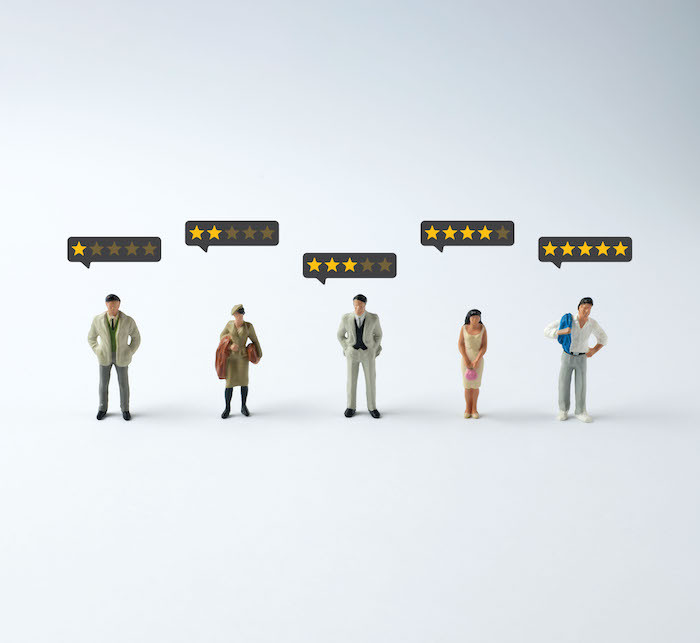
A surprisingly high majority of online product reviews are positive. Jake O'Brien Murphy carries out his own study to see if the same is true of hospitality scrutiny.
I’m saving for a house and so I read a lot of reviews online to make sure when I do spend money, I’m maximising its potential. Incidentally, this is how I ended up deciding I categorically needed my Dual Zone Ninja Air Fryer. Hot tip – it basically pays for itself! All that being said, I find it interesting that I treat online reviews of bars with a heightened sense of incredulity. I'm left wondering why that is and, most importantly, whether reviews can really be trusted.
Broadly, reviews can be separated into two camps. Quantitative and qualitative. Quantitative is mainly online reviews forming general consensus through the collective effort of opinionated strangers. The intention is that the subjectivity will average out into a Goldilocks middle ground. Importantly, the only barrier to entry here is online moderation against inflammatory language. A big thumbs up from me there. Call me a snowflake, but I don’t think a local branch of Bella Italia could ever be so bad to warrant hate speech.
Qualitative is based on a singular expertise. Journalists, bloggers, or anyone who expresses a formalised opinion. The prerequisite is that it requires a basic knowledge of the topic – though in the modern world, expertise is often conflated with having access to the internet and a remedial mastery of the English language.
In this article, we'll deal with quantitative. In the case of online reviews, Google, Tripadvisor, et al, I’d always assumed that given the smallest whiff of authority, the general populace would veer maniacally towards unremitting negativity. A bit like the Stanford Prison Experiment, which was one of those social studies that could only exist in the LSD-addled 1970s. Essentially a group of university students were randomly split off into prisoners and guards in a simulated prison environment. To literally nobody’s surprise, the guards transformed into a shower of unrepentent bastards before lunch.
However, as studies show, people leaving reviews are actually kinda nice. Almost 80% of the sample set would fall into the broadly positive bracket. However, this is in a controlled group, specifically looking at product reviews. If I wanted to prove that people are terrible with collaborative data, I’d have to conduct my own research.
Broad appeal
So I did. I aggregated the 10 most recent reviews from 25 randomly selected venues. I was careful to make sure the range I picked from had broad general appeal and it’s also important to point out that I was only looking at the numerical values given and not the emotive, qualitative language used. To my surprise, this still averaged out at around 60% positive. Clearly, the test was flawed. I find it hard to believe that this data set could be scaled up to encompass the entire hospitality industry and yield similar results – mainly because there really is some ossifying shit out there.
One potential answer is the something called the Hawthorne effect – simply put, that people moderate their behaviour when they know they are being observed. This is backed up somewhat by a person’s online fingerprint. Those who have an integrated cross-platform identity are more likely to self-moderate. Whereas people who hid behind the armour of anonymity with usernames such as Boobmeister69, ~BritishBullDog~ or XxHappyflapsxX are more likely to post bilious cries for attention.
My working theory is that the people writing these positive reviews are operating under a weird confirmation bias. Hear me out. Those select few who spend time writing reviews, in earnest, are the kinds of people who enjoy expressing their opinion. It takes a certain person to think: “The world must know what Kevin thinks of the All Bar One in Upton Snodsbury.” Therefore it only follows that these people would be willing to massage their opinions as proof of their own magnanimity. Further evidence of this is my own Google reviews page, in which I have posted 24 reviews - 23 of those being 5-star and one of those, or 4.17%, being a 4-star review. Essentially, it isn’t a critique of a venue more than it is ten bob Messiah Complex.
So can you trust online reviews? In the immortal words of Super Hans: “People like Coldplay and voted for the Nazis. You can’t trust people.” As for the literal hundreds of thousands of 1-star reviews, these are undoubtedly always far more entertaining to read. However, save for a few legitimate grievances they seem to be mostly written as online vendettas by the kinds of socially disaffected people who wouldn’t cover their mouths as they cough.


